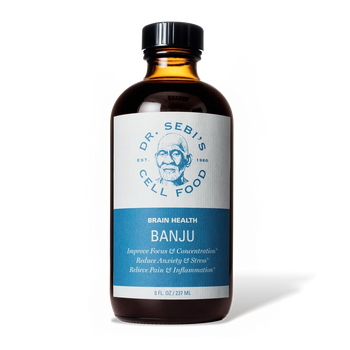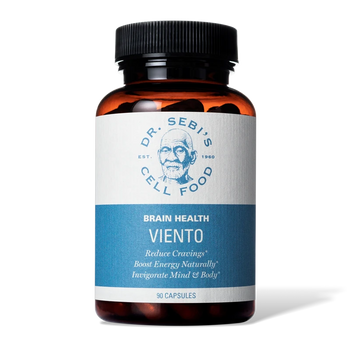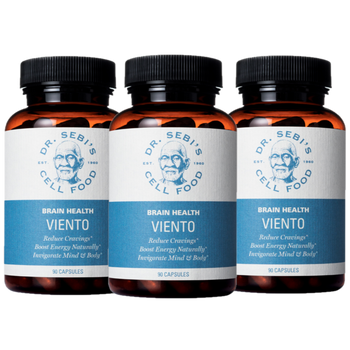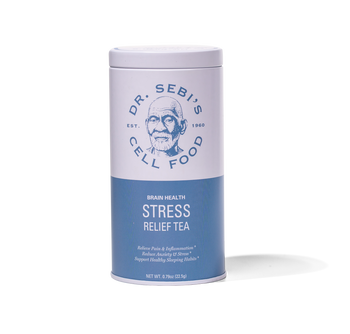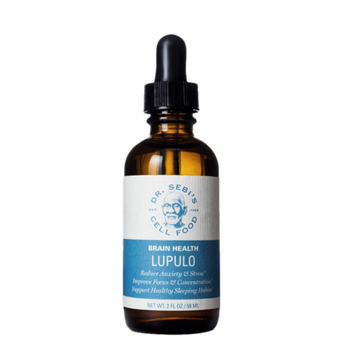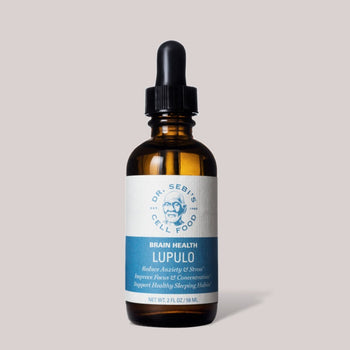The connection between what we eat and how we feel is undeniable. Most people think of food only in terms of physical health—energy, digestion, or immunity—but the mind and body are inseparable. Our moods, focus, and emotional balance are profoundly shaped by the chemistry of our blood and cells.
Dr. Sebi believed that you can’t have a healthy mind in a sick body. His alkaline philosophy was not just about cleansing or longevity—it was about restoring balance on every level. When the body is free of toxins and nourished with living minerals, the nervous system functions smoothly, stress is reduced, and emotional stability follows naturally.
This article explores how alkaline eating influences mood, stress, and emotional well-being, and which herbs and foods best support mental clarity and peace.
The Body–Mind Connection
The brain is not separate from the rest of the body—it depends on the same nutrients, circulation, and electrical energy that sustain all organs. Every emotion is a chemical reaction influenced by:
-
Neurotransmitters like serotonin and dopamine.
-
Hormones like cortisol (stress) and melatonin (sleep).
-
Minerals like magnesium, calcium, and iron that regulate nerve and muscle function.
When the body is acidic or mucus-laden, these systems are disrupted. The nervous system becomes overstimulated, blood flow decreases, and mood instability follows.
How Acidic Foods Affect Mood
Acid-forming foods—such as processed grains, dairy, meat, refined sugar, and caffeine—disturb the body’s pH balance. Over time, they:
-
Deplete minerals needed for nerve function and relaxation.
-
Increase inflammation, which affects brain chemistry.
-
Raise cortisol, leading to chronic stress and anxiety.
-
Block oxygen flow, reducing mental clarity.
The result is a pattern of highs and crashes—temporary stimulation followed by fatigue, irritability, or sadness.
How Alkaline Foods Restore Emotional Balance
Dr. Sebi’s approach to mental and emotional health began with purification. He taught that when the blood is clean and the nervous system is mineralized, peace and clarity naturally emerge.
1. Oxygenation and Circulation
Leafy greens and herbs cleanse the blood, delivering oxygen to the brain and balancing mood.
2. Mineral Nourishment
Iron, magnesium, and calcium from alkaline foods regulate nerve impulses and prevent anxiety.
3. Gut–Brain Balance
The gut produces 90% of serotonin. Alkaline foods rich in fiber and natural probiotics support a healthy microbiome and stable mood.
4. Reduced Inflammation
Antioxidants from fruits and herbs calm inflammation in the brain linked to depression and mental fatigue.
5. Nervous System Calm
Herbs like chamomile and tila relax the body, reducing stress-related symptoms.
Alkaline Foods for Emotional Wellbeing (from Nutritional Guide)
1. Leafy Greens
-
Dandelion greens, kale, watercress, amaranth greens
Rich in magnesium and iron for oxygenation and stress reduction.
2. Fruits
-
Berries: Antioxidants that protect neurons and support dopamine balance.
-
Seeded grapes: Improve circulation and calm the nervous system.
-
Figs and dates: Provide gentle sweetness and minerals to support energy and mood.
3. Vegetables
-
Squash and zucchini: Easy to digest and rich in magnesium for relaxation.
-
Cucumbers: Hydrating and cooling to the nervous system.
4. Grains
-
Quinoa, spelt, wild rice, fonio: Complex carbohydrates that support serotonin production.
5. Nuts & Seeds
-
Walnuts: Contain omega fatty acids that enhance brain function.
-
Hemp seeds: Provide balanced protein and magnesium.
-
Sesame seeds (tahini): Supply calcium and zinc for nerve stability.
6. Herbs
-
Chamomile & tila (linden flower): Relax muscles, calm the mind, and improve sleep.
-
Burdock root: Cleanses the blood, reducing toxins that cloud mood.
-
Elderberry: Boosts immune and nervous system resilience.
-
Ginger: Improves circulation and energy flow.
The Gut–Brain Axis and Alkalinity
Recent research confirms what traditional healers have long known: the gut and brain are deeply connected. The microbes in our intestines communicate with the brain via the vagus nerve and influence mood, cognition, and stress.
An alkaline diet—rich in fiber, plant compounds, and minerals—feeds beneficial bacteria while suppressing harmful, sugar-dependent microbes. The result is improved serotonin balance, better digestion, and greater emotional stability.
Practical Daily Habits for Emotional Balance
-
Start the Day Alkaline
Drink warm water with key lime or herbal tea upon waking. Follow with fruit or a smoothie for gentle energy. -
Eat Consistently
Avoid skipping meals; stable energy keeps mood steady. -
Hydrate Throughout the Day
Dehydration increases stress hormones. Drink spring water regularly. -
Use Herbs Intentionally
Have chamomile or tila tea before bed, burdock or ginger tea in the morning. -
Limit Screen Time and Stimulants
Caffeine, energy drinks, and excessive blue light overstimulate the nervous system. -
Practice Mindful Breathing
Oxygenation supports both alkalinity and calmness.
Sample Daily Alkaline Mood-Supporting Menu
Breakfast
-
Quinoa porridge with figs and hemp seeds.
-
Chamomile tea.
Lunch
-
Spelt wrap with kale, avocado oil, and cherry tomatoes.
-
Cucumber salad with lime.
Snack
-
Blueberries and walnuts.
-
Elderberry tea.
Dinner
-
Wild rice with sautéed watercress and squash.
-
Ginger tea or Stress Relief Tea before bed.
Emotional Detox: When Healing Feels Uncomfortable
As the body transitions from acidic to alkaline, some people experience temporary emotional release—feelings of irritability, sadness, or fatigue. This is often a natural part of detoxification as toxins and stress hormones leave the system.
Dr. Sebi encouraged patience during this phase, emphasizing rest, hydration, and continued nourishment. As the blood clears, emotional balance and mental clarity return stronger than before.
FAQs
Q: Can food really affect emotions?
A: Yes. The brain depends on nutrients and minerals from food. Alkaline foods improve circulation, oxygen, and neurotransmitter function, directly influencing mood. Most are familiar with comfort foods, but eating alkaline foods continuously helps to regulate emotions before they take over.
Q: Are herbs safe to use daily for stress?
A: Yes. Gentle herbs like chamomile, tila, and ginger can be enjoyed daily to support relaxation.
Q: What’s the best way to start an alkaline transition for mood support?
A: Begin by removing processed foods and adding one or two alkaline meals per day. Include hydration and herbal teas.
Q: How long until I feel results?
A: Many people report improved focus and calmness within 1–2 weeks, though full balance can take several months of consistent practice.
Dr. Sebi’s Perspective
Dr. Sebi saw emotional imbalance—depression, anxiety, irritability—not as purely mental disorders, but as reflections of internal toxicity. When the blood is acidic and the nervous system is overworked, emotional instability follows.
His approach was to cleanse the body through fasting, hydration, and herbal support, then rebuild with mineral-rich foods. He often recommended herbs like tila and chamomile to calm the spirit, and greens like kale and dandelion to nourish the blood.
To him, emotional wellbeing was a natural result of physical clarity: when the body is in tune with nature, the mind finds peace.
Conclusion
Our emotions do not exist in isolation—they are the language of the body’s chemistry. When the blood is clean, the gut is balanced, and the nervous system is nourished, peace and clarity follow naturally.
Alkaline foods like leafy greens, fruits, and whole grains, combined with calming herbs such as chamomile, tila, burdock, and elderberry, provide the minerals and plant compounds needed for emotional resilience.
Dr. Sebi’s message remains timeless: health and happiness are not separate pursuits—they are the same path. By choosing living, alkaline foods, we don’t just heal the body; we free the mind.


